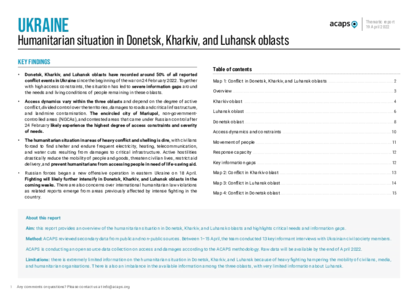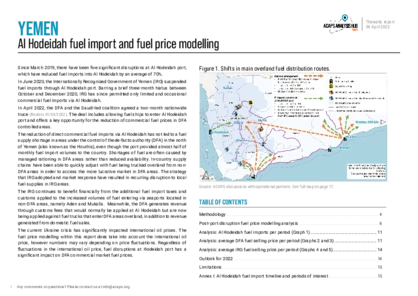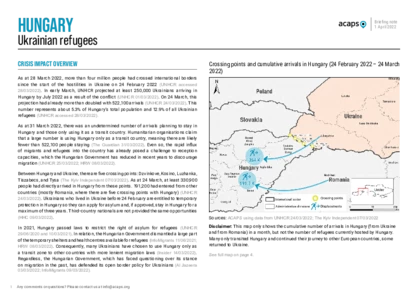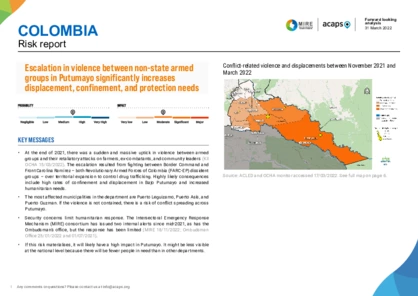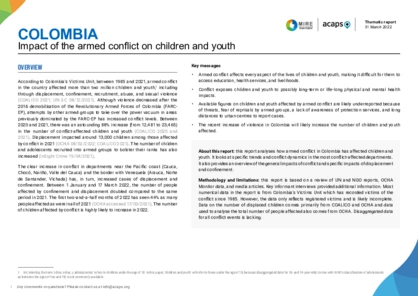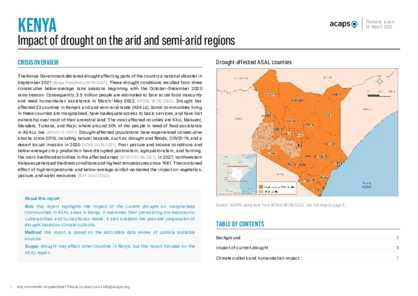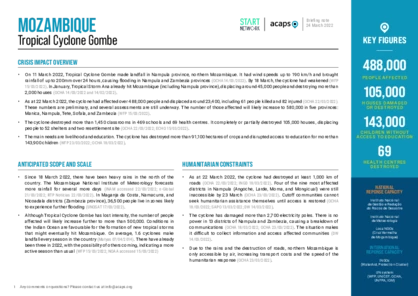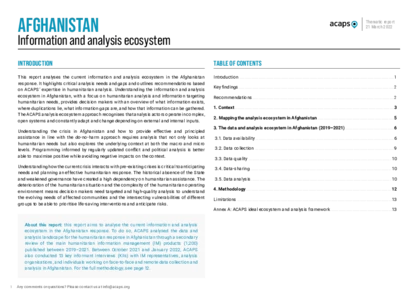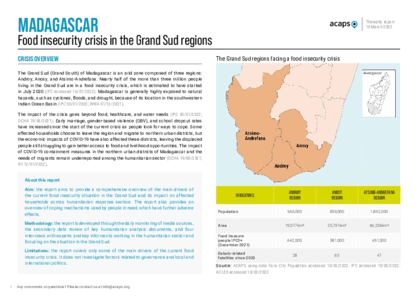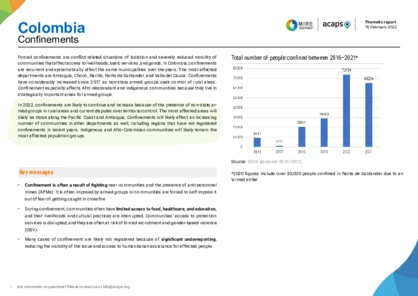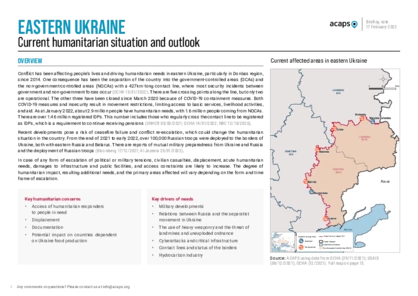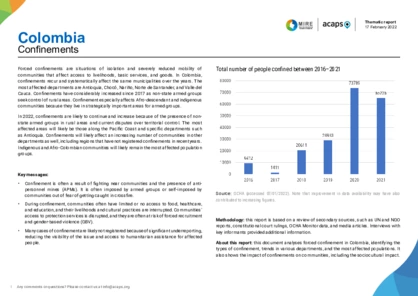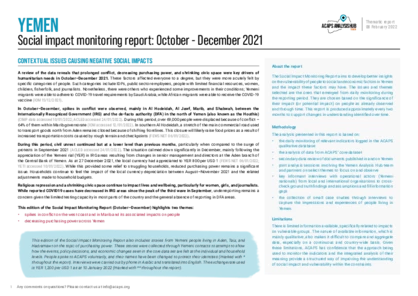Explore our
analysis products
archive
19 April 2022
Ukraine: Humanitarian situation in Kharkiv, Luhansk, and Donetsk
DOCUMENT / PDF / 9 MB
This report provides an overview of the humanitarian situation in these areas and highlights critical needs and information gaps. We have reviewed secondary data from public and non-public sources, and between 1–15 April, the team conducted key informant interviews with Ukrainian civil society members.
04 April 2022
Yemen: Al Hodeidah fuel import and fuel price modelling
DOCUMENT / PDF / 4 MB
The primary objective of this report is to determine the impact that the easing of disruption to commercial fuel imports via Al Hodeidah since January 2021 would have on fuel prices in areas under the control of the de-facto authority (DFA) in the north of Yemen, and in areas of the Internationally Recognized Government of Yemen (IRG).
01 April 2022
Hungary: Ukrainian refugees
DOCUMENT / PDF / 509 KB
As at 28 March 2022, more than four million people had crossed international borders since the start of the hostilities in Ukraine on 24 February 2022. The rapid influx of migrants and refugees into the country has already posed a challenge to reception capacities, which the Hungarian Government has reduced in recent years to discourage migration.
31 March 2022
Colombia: Escalation of violence in Putumayo
DOCUMENT / PDF / 2 MB
Putumayo, a department in southwest Colombia bordering Ecuador and Perú, is a strategic corridor for human trafficking, drug and arms trafficking, and resource extraction. Indigenous communities are especially at risk of confinement and limitations on their daily activities.
Attached resources
31 March 2022
Colombia: Impact of the armed conflict on children and youth
DOCUMENT / PDF / 529 KB
This report analyses how armed conflict in Colombia has affected children and youth. It looks at specific trends and conflict dynamics in the most conflict-affected departments. It also provides an overview of the general impacts of conflict and specific impacts of displacement and confinement.
Attached resources
31 March 2022
Kenya: Impact of drought
DOCUMENT / PDF / 726 KB
This report highlights the impact of the current drought on marginalised communities in Kenya's arid and semi-arid lands. It examines their pre-existing socioeconomic vulnerabilities and humanitarian needs. It also analyses the possible progression of drought based on climate outlooks.
24 March 2022
CrisisInSight: Global Risk Analysis
DOCUMENT / PDF / 2 MB
ACAPS’ Global Risk Analysis outlines a number of key contexts where a particular situation may notably deteriorate within the next six months, causing (a spike in) humanitarian needs. The risks included in this report were based on certain events or factors (triggers) that may emerge over the coming six months.
24 March 2022
Mozambique: Tropical cyclone Gombe
DOCUMENT / PDF / 191 KB
As at 22 March 2022, the cyclone had affected over 488,000 people and displaced around 23,400. The number of those affected will likely increase to 580,000 in five provinces: Manica, Nampula, Tete, Sofala, and Zambezia. The main needs are livelihood and education.
21 March 2022
Afghanistan: Information and analysis ecosystem
DOCUMENT / PDF / 2 MB
This report aims to analyse the current information and analysis ecosystem in the Afghanistan response. ACAPS analysed the data and analysis landscape for the humanitarian response in Afghanistan through a secondary review of the main humanitarian information management products published between 2019–2021. We also conducted 13 key informant interviews.
10 March 2022
Madagascar: Food insecurity crisis in the Grand Sud regions
DOCUMENT / PDF / 575 KB
The report aims to provide a comprehensive overview of the main drivers of the current food insecurity situation in the Grand Sud and its impact on affected households across humanitarian response sectors. The report also provides an overview of coping mechanisms used by people in need, which have further adverse effects.
09 March 2022
Colombia: Update on the overview of risks from November 2021 to April 2022
DOCUMENT / PDF / 694 KB
ACAPS identified five risks to the humanitarian context and published an overview report in November 2021 looking at the following six months. After monitoring each risk and its corresponding indicators and reviewing any relevant developments since November, ACAPS analysts and technical experts were able to update the risk outlook, creating the basis for this risk update.
Attached resources
07 March 2022
Gaps in gender research in the Rohingya refugee response
DOCUMENT / PDF / 298 KB
This report provides a specific understanding of gendered needs and explore how these needs intersect with other dimensions, such as age, disability, social status, education, income, legal status, and religion. But despite the developments, several gaps in understanding shifts in gender norms and practices in the Rohingya community and their impact on specific populations still exist.
21 February 2022
Colombia: Confinements
DOCUMENT / PDF / 1 MB
This document analyses forced confinement in Colombia, identifying the types of confinement, trends in various departments, and the most affected populations. It also shows the impact of confinements on communities, including the sociocultural impact. It is based on a review of secondary sources. Interviews with key informants provided additional information.
Attached resources
17 February 2022
Eastern Ukraine: current humanitarian crisis and outlook
DOCUMENT / PDF / 5 MB
This report explores the possible impacts of escalating tensions between Russia and Ukraine on the humanitarian situation in Donbas and potentially the rest of the country. It presents the response capacity and various operational constraints faced by responders. It also analyses the factors that may increase needs and potential key humanitarian concerns in the coming months.
Attached resources
17 February 2022
Colombia: Confinements
DOCUMENT / PDF / 3 MB
This document analyses forced confinement in Colombia, identifying the types of confinement, trends in various departments, and the most affected populations. It also shows the impact of confinements on communities, including the sociocultural impact.
08 February 2022
Yemen: Social impact monitoring October - December 2021
DOCUMENT / PDF / 5 MB
The Social Impact Monitoring Report aims to develop better insights on the vulnerability of people to social and economic factors in Yemen and the impact these factors may have. This report is produced approximately every two months to support changes in understanding identified over time.
04 February 2022
Brazil: Floods in Bahia and Minas Gerais
DOCUMENT / PDF / 510 KB
Because of a meteorological phenomenon known as the South Atlantic Convergence Zone, the Brazilian states of Bahia and Minas Gerais have been experiencing heavy rainfall since early December. The rains have caused flooding in 164 municipalities in Bahia and 341 in Minas Gerais. As at 25 January, more than 965,000 people in both states are affected.


